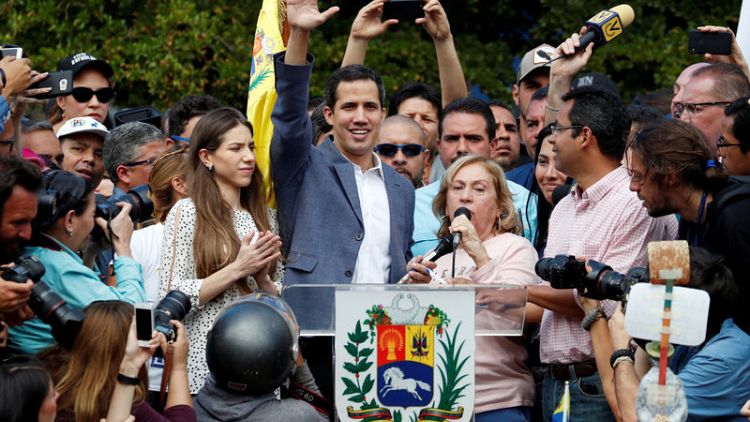By Michelle Nichols and Frank Jack Daniel
UNITED NATIONS/CARACAS (Reuters) - The United States on Saturday called on the world to "pick a side" on Venezuela and urged countries to financially disconnect from Nicolas Maduro's government, while European powers signaled they were set to follow Washington in recognising Venezuelan opposition leader Juan Guaido as the country's rightful leader.
In heated back-and-forth exchanges at a United Nations Security Council meeting, the opposing camp led by Venezuela and Russia, which has invested heavily in Venezuela's oil industry, accused Washington of attempting a coup, and lambasted Europeans' demand that elections be called within eight days.
Guaido, who took the helm of the National Assembly on Jan. 5, proclaimed himself interim president on Wednesday. The United States, Canada and a string of Latin American countries recognised the young leader in quick succession. But Maduro, who has led the oil-rich nation since 2013 and has the support of the armed forces, has refused to stand down.
Speaking at the U.N. meeting called by the United States, U.S. Secretary of State Mike Pompeo said Maduro's "socialist experiment" had caused the economy to collapse and reduced ordinary Venezuelans to rooting through dumpsters for food.
"Now it is time for every other nation to pick a side. ... Either you stand with the forces of freedom, or you're in league with Maduro and his mayhem," Pompeo told the council. "We call on all members of the Security Council to support Venezuela's democratic transition and interim President Guaido's role."
Pompeo also called on the international community to disconnect their financial systems from Maduro's regime. Washington has signaled it was ready to step up economic measures to try to drive Maduro from power, but on Saturday Pompeo declined to elaborate on any such plans.
By overcoming opposition to holding the U.N. meeting on Saturday, Washington successfully put the global spotlight on Venezuela as a Security Council problem. However, any council action to address the crisis would be blocked by veto-powers Russia and China, diplomats said.
Britain, Germany, France and Spain all said on Saturday they would recognise Guaido if Maduro failed to call fresh elections in eight days, an ultimatum Russia said was "absurd" and the Venezuelan foreign minister called "childlike."
"Europe is giving us eight days? Where do you get that you have the power to establish a deadline or an ultimatum to a sovereign people?" Venezuela's Foreign Minister Jorge Arreaza told the Security Council.
Russia also said military intervention in Venezuela should be avoided at any cost, while Caracas reiterated that its offer of dialogue with President Donald Trump's government was still on the table despite his administration's two-year campaign against Maduro.
'FULL SUPPORT'
Venezuela has sunk into turmoil under Maduro with food shortages and daily protests amid an economic and political crisis that has sparked mass emigration and inflation that is seen rising to 10 million percent this year.
Maduro cruised to re-election last May amid low turnout and allegations of vote buying by the government. The domestic opposition, the United States and right-leaning Latin American governments declined to recognise the result of the ballot.
Venezuelan opposition sympathizers had been urging Guaido to assume the presidency since Maduro was inaugurated for a second term on Jan. 10. Hundreds of thousands took to the streets in Caracas earlier this week, calling on Maduro to step down.
Guaido's declaration of himself as the interim president takes Venezuela into uncharted territory, with the possibility of the opposition now running a parallel government recognised abroad as legitimate but without control over state functions.
On Saturday, Guaido celebrated the support of European countries and asked them to send humanitarian aid to help relieve the economic crisis. "We woke up today with nothing less than the full support of the European community," Guaido said at a small political event in a square in the capital Caracas.
"Several European countries have been in touch with us and are going to support the entry of humanitarian aid. ... We continue adding countries to this great effort," he said.
The Maduro government has previously rejected such aid, denying there is a humanitarian crisis in the country and blaming economic problems on sanctions.
After Washington's declaration of support for Guaido, Maduro cut off diplomatic relations with the United States on Wednesday and gave U.S. diplomats 72 hours to leave the country.
Although some diplomats left on Friday, Guaido said the U.S. embassy was still working and that embassy officials had been to visit him.
(Additional reporting by Paul Day in Madrid and Mayela Armas in Caracas; Writing by Humeyra Pamuk; Editing by Mary Milliken and Jonathan Oatis)
